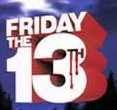Why Friday the 13th Is Unlucky
 Paraskevidekatriaphobia: Fear of Friday the 13th
Paraskevidekatriaphobia: Fear of Friday the 13th
"Friday 13th is unlucky for some. The risk of hospital admission as a result of a transport accident may be increased by as much as 52 percent. Staying at home is recommended."
Paraskevidekatriaphobics — people afflicted with a morbid, irrational fear of Friday the 13th — must be pricking up their ears just now, buoyed by seeming evidence that their terror may not be so irrational after all. But it's unwise to take solace in a single scientific study — the only one of its kind, so far as I know — especially one so peculiar. I suspect these statistics have more to teach us about human psychology than the ill-fatedness of any particular date on the calendar.
Friday the 13th - The Most Widespread Superstition?
The sixth day of the week and the number 13 both have foreboding reputations said to date from ancient times, and their inevitable conjunction from one to three times a year portends more misfortune than some credulous minds can bear. Some sources say it may be the most widespread superstition in the United States. Some people won't go to work on Friday the 13th; some won't eat in restaurants; many wouldn't think of setting a wedding on the date.
Just how many Americans at the turn of the millennium still suffer from this condition? According to Dr. Donald Dossey, a psychotherapist specializing in the treatment of phobias (and coiner of the term "paraskevidekatriaphobia"), the figure may be as high as 21 million. If he's right, eight percent of Americans are still in the grips of a very old superstition.
Exactly how old is difficult to say, because determining the origins of superstitions is an imprecise science, at best. In fact, it's mostly guesswork.
13: The Devil's Dozen
It is said: If 13 people sit down to dinner together, all will die within the year. The Turks so disliked the number 13 that it was practically expunged from their vocabulary (Brewer, 1894). Many cities do not have a 13th Street or a 13th Avenue. Many buildings don't have a 13th floor. If you have 13 letters in your name, you will have the devil's luck (Jack the Ripper, Charles Manson, Jeffrey Dahmer, Theodore Bundy and Albert De Salvo all have 13 letters in their names). There are 13 witches in a coven.
Anathema
Other sources speculate that the number 13 may have been purposely vilified by the founders of patriarchal religions in the early days of western civilization because it represented femininity. Thirteen had been revered in prehistoric goddess-worshiping cultures, we are told, because it corresponded to the number of lunar (menstrual) cycles in a year (13 x 28 = 364 days). The "Earth Mother of Laussel," for example — a 27,000-year-old carving found near the Lascaux caves in France often cited as an icon of matriarchal spirituality — depicts a female figure holding a cresent-shaped horn bearing 13 notches. As the solar calendar triumphed over the lunar with the rise of male-dominated civilization, it is surmised, so did the number 12 over the number 13, thereafter considered anathema.
On the other hand, one of the earliest concrete taboos associated with the number 13 — a taboo still observed by some superstitious folks today, evidently — is said to have originated in the East with the Hindus, who believed, for reasons I haven't been able to ascertain, that it is always unlucky for 13 people to gather in one place — say, at dinner. Interestingly enough, precisely the same superstition has been attributed to the ancient Vikings (though I have also been told, for what it's worth, that this and the accompanying mythographical explanation are apocryphal). The story has been laid down as follows:
Loki, the Evil One
Twelve gods were invited to a banquet at Valhalla. Loki, the Evil One, god of mischief, had been left off the guest list but crashed the party, bringing the total number of attendees to 13. True to character, Loki raised hell by inciting Hod, the blind god of winter, to attack Balder the Good, who was a favorite of the gods. Hod took a spear of mistletoe offered by Loki and obediently hurled it at Balder, killing him instantly. All Valhalla grieved. And although one might take the moral of this story to be "Beware of uninvited guests bearing mistletoe," the Norse themselves apparently concluded that 13 people at a dinner party is just plain bad luck.
As if to prove the point, the Bible tells us there were exactly 13 present at the Last Supper. One of the dinner guests — er, disciples — betrayed Jesus Christ, setting the stage for the Crucifixion.
Bad Friday
It is said: Never change your bed on Friday; it will bring bad dreams. Don't start a trip on Friday or you will have misfortune. If you cut your nails on Friday, you cut them for sorrow. Ships that set sail on a Friday will have bad luck – as in the tale of H.M.S. Friday ... One hundred years ago, the British government sought to quell once and for all the widespread superstition among seamen that setting sail on Fridays was unlucky. A special ship was commissioned, named "H.M.S. Friday." They laid her keel on a Friday, launched her on a Friday, selected her crew on a Friday and hired a man named Jim Friday to be her captain. To top it off, H.M.S. Friday embarked on her maiden voyage on a Friday, and was never seen or heard from again.
More from David Emery















No comments:
Post a Comment